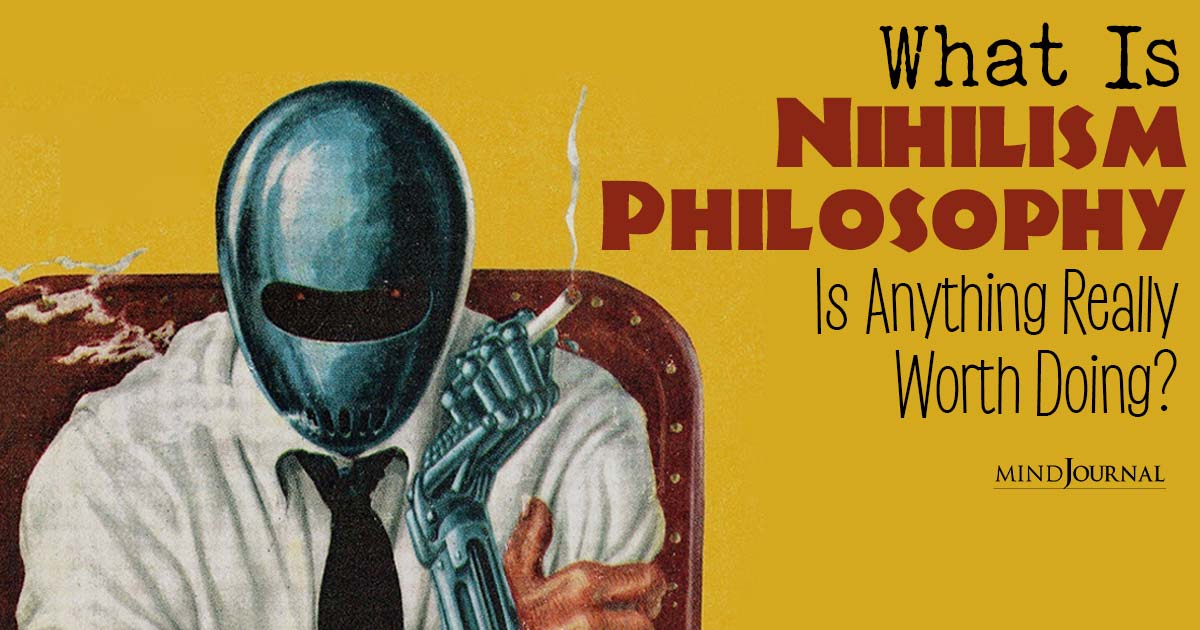Have you ever questioned the purpose of your existence? Wondered if there is any meaning to life at all? If so, you may have encountered the philosophical concept of existential nihilism. Let us explore this intriguing idea and its implications for individuals and society.
What is nihilism philosophy?
Nihilism is a philosophy that denies the existence of any objective meaning or value in life. Nihilists believe that there is no God, no soul, no free will, and no purpose to existence. They believe that all of our actions are ultimately meaningless, and that there is no point in trying to achieve anything in life.
This can lead to a sense of despair or hopelessness, as it suggests that all human endeavors are ultimately futile. Nihilism can be seen as a rejection of traditional values and beliefs, including religious, moral, and cultural ones.
Related: Philosophy 101: 10 Philosophical Concepts To Help You Navigate Life’s Complexities
When you understand what is nihilism, you realize that this philosophical concept is often associated with pessimism and despair, but it can also be seen as a liberating philosophy. Nihilism can free people from the constraints of traditional morality and religion, and allow them to live their lives without fear of punishment or reward.
Nihilism can also lead to a greater appreciation of life, as nihilists come to realize that the only meaning in life is the meaning that they create for themselves.

The history of nihilism philosophy
Nihilism is a relatively new philosophy, with its roots in the 19th century. The term was first used by the German philosopher Friedrich Nietzsche, who argued that there is no God, no soul, and no free will.
Nietzsche believed that nihilism was the inevitable result of the Enlightenment, which had destroyed traditional religious beliefs and values. Nietzsche’s philosophy of nihilism was influential on a number of other philosophers, including Albert Camus, Jean-Paul Sartre, and Friedrich Wilhelm Nietzsche.
Camus argued that nihilism is the only true philosophy, and that it is the only way to face the absurd reality of human existence. Sartre argued that nihilism is the starting point for all philosophy, and that it is the task of the philosopher to create meaning in a world that is inherently meaningless.
Forms of nihilism
There are several different forms of nihilism, each with its own unique characteristics. The most commonly recognized forms are:
1. Epistemological nihilism
This argues that there is no objective truth or knowledge, and that all beliefs and values are merely subjective opinions.
According to epistemological nihilists, human beings are incapable of knowing anything with certainty, and the search for truth is ultimately futile.
2. Moral nihilism
It that there are no objective moral values, and that any attempt to impose moral standards is ultimately arbitrary.
Moral nihilists argue that there is no inherent good or evil in the world, and that individuals must create their own moral codes based on their personal preferences and desires.
3. Existential nihilism
What is existential nihilism? This form suggests that life has no inherent meaning or purpose, and that individuals must create their own meaning in a meaningless world.
When you know what is existential nihilism, you understand that there is no higher power or ultimate goal to human existence, and that individuals must find their own reasons for living.
Unlike other forms of nihilism, which focus on rejecting specific values or beliefs, existential nihilism is a more all-encompassing rejection of the idea that there is any inherent significance to human existence.
Related: What Is The Main Idea Of Existentialism? Exploring The Philosophy Of Individual Freedom And Choice
This can lead to feelings of despair or hopelessness, as individuals struggle to find meaning in a world that seems fundamentally meaningless.
However, some people find a sense of liberation in existential nihilism, as it allows them to create their own meaning and purpose in life without being bound by external values or expectations.
4. Aesthetic nihilism
This form of nihilism suggests that there is no inherent beauty or value in art or culture, and that any attempt to impose aesthetic standards is ultimately arbitrary.
Aesthetic nihilists believe that art is a purely subjective experience, and that individuals must create their own definitions of beauty and meaning in the world.
5. Political nihilism
This form rejects all political and social institutions, arguing that they are ultimately meaningless and serve only to maintain the status quo.
Political nihilists believe that human beings are fundamentally selfish and that any attempt to create a just or equitable society is doomed to fail.
While these different forms of nihilism share a rejection of traditional values and beliefs, they each have their own unique characteristics and implications for individuals and society.
Implications of nihilism philosophy
The implications of nihilism can be both personal and societal. On a personal level, it can lead to feelings of despair and hopelessness. It can be difficult to find motivation or meaning in life if one believes that everything is ultimately meaningless.
However, it’s worth noting that some people find a sense of freedom in nihilism, as it allows them to reject societal norms and expectations.
On a societal level, nihilism can be problematic if it leads to a rejection of shared values and beliefs. If everyone believes that there is no objective truth or moral standard, it can be difficult to establish a shared sense of purpose or direction.
This can lead to a breakdown in social cohesion and a sense of disconnection from others. Understanding this philosophical concept can provide insight into the complexity of human thought and the various ways in which individuals attempt to make sense of the world around them.

Takeaway
Nihilism is a complex and challenging philosophy, and it is important to understand it before dismissing it out of hand. Nihilism can be a source of great insight and liberation, but it can also be destructive and harmful.
It is important to weigh the pros and cons of nihilism before deciding whether or not it is a philosophy that you can embrace.
Related: The Liberating Absurdism Philosophy: Absurdism Meaning, Benefits And Ways To Embrace It
Frequently Asked Questions (FAQs):
What is a nihilist person?
A nihilist is someone who believes in the rejection of all religious, moral, and political beliefs, and in the absence of any objective meaning or purpose in life.
Can a nihilist believe in God?
Yes, a nihilist can believe in God, but they may reject the idea of a divine purpose or meaning to life.
Is nihilism good or bad?
Nihilism is neither inherently good nor bad. It is a philosophical position that can lead to different interpretations and outcomes.










Leave a Reply